Management and Operations: Positive, Efficient, Effective Contribution
VerifiedAdded on 2023/01/07
|16
|4744
|97
Report
AI Summary
This report provides a comprehensive analysis of management and operations, focusing on leadership roles and their impact on organizational efficiency and effectiveness. It uses Corus Group PLC as a case study to illustrate the differences between leaders and managers, their situational applicati...
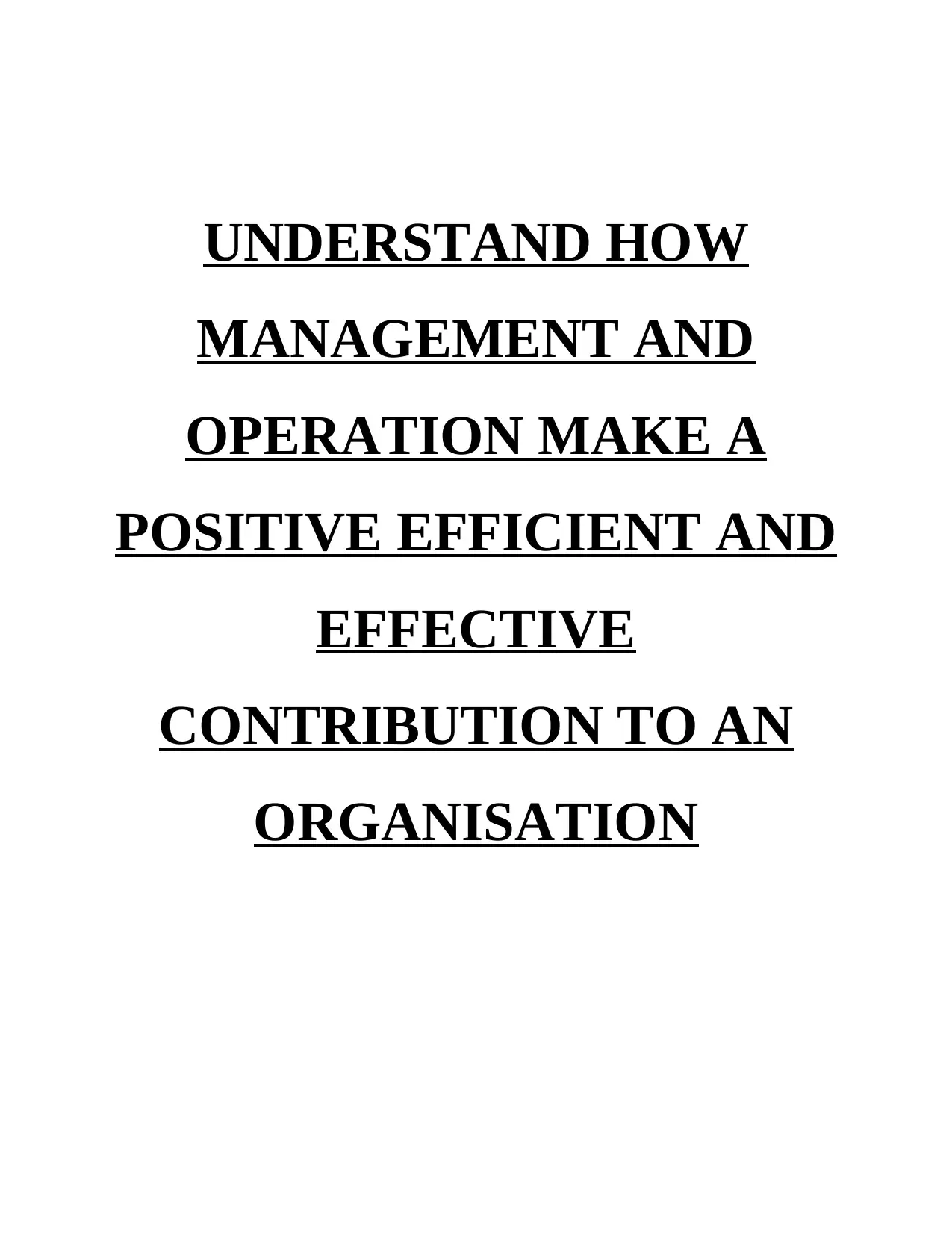
UNDERSTAND HOW
MANAGEMENT AND
OPERATION MAKE A
POSITIVE EFFICIENT AND
EFFECTIVE
CONTRIBUTION TO AN
ORGANISATION
MANAGEMENT AND
OPERATION MAKE A
POSITIVE EFFICIENT AND
EFFECTIVE
CONTRIBUTION TO AN
ORGANISATION
Paraphrase This Document
Need a fresh take? Get an instant paraphrase of this document with our AI Paraphraser
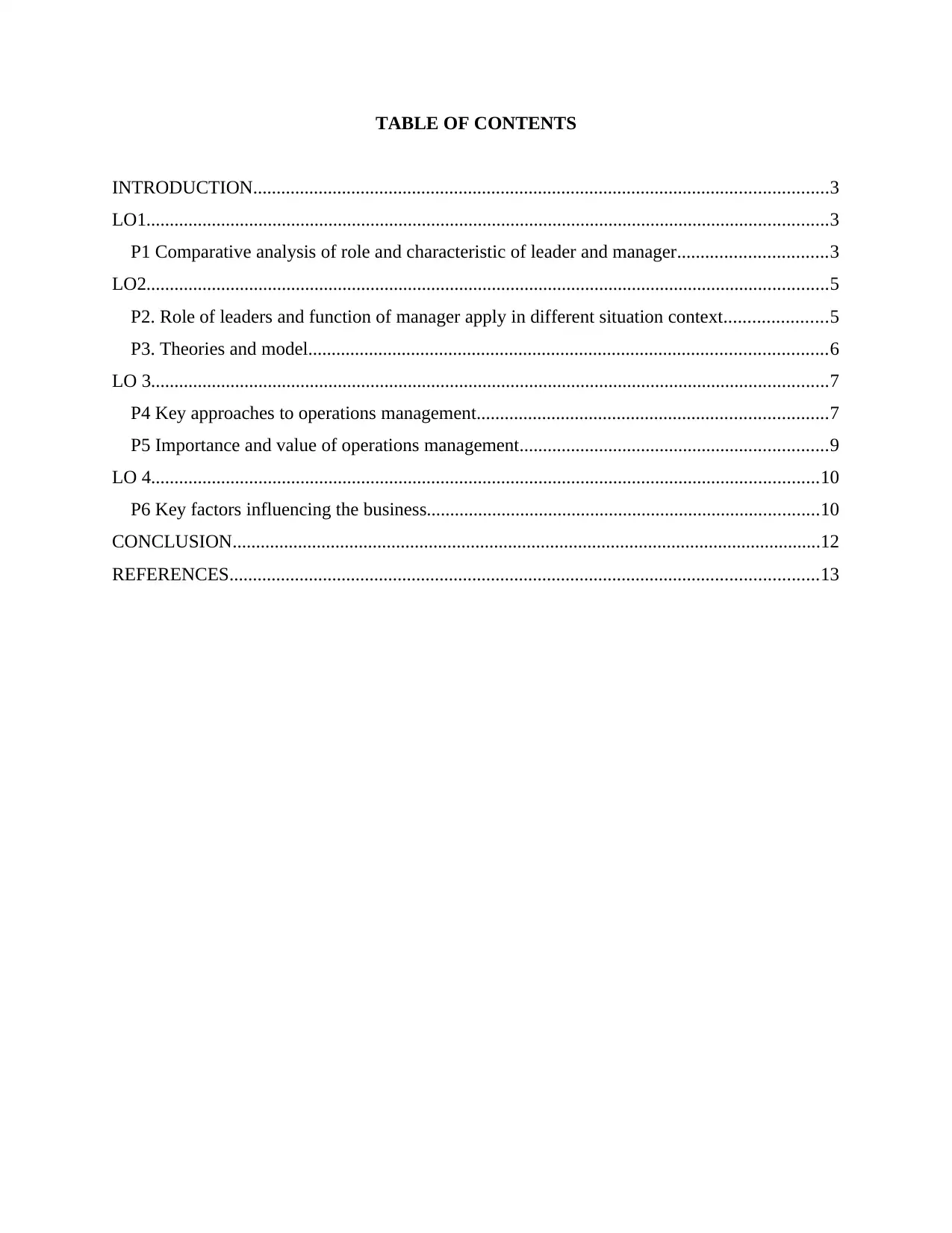
TABLE OF CONTENTS
INTRODUCTION...........................................................................................................................3
LO1..................................................................................................................................................3
P1 Comparative analysis of role and characteristic of leader and manager................................3
LO2..................................................................................................................................................5
P2. Role of leaders and function of manager apply in different situation context......................5
P3. Theories and model...............................................................................................................6
LO 3.................................................................................................................................................7
P4 Key approaches to operations management...........................................................................7
P5 Importance and value of operations management..................................................................9
LO 4...............................................................................................................................................10
P6 Key factors influencing the business....................................................................................10
CONCLUSION..............................................................................................................................12
REFERENCES..............................................................................................................................13
INTRODUCTION...........................................................................................................................3
LO1..................................................................................................................................................3
P1 Comparative analysis of role and characteristic of leader and manager................................3
LO2..................................................................................................................................................5
P2. Role of leaders and function of manager apply in different situation context......................5
P3. Theories and model...............................................................................................................6
LO 3.................................................................................................................................................7
P4 Key approaches to operations management...........................................................................7
P5 Importance and value of operations management..................................................................9
LO 4...............................................................................................................................................10
P6 Key factors influencing the business....................................................................................10
CONCLUSION..............................................................................................................................12
REFERENCES..............................................................................................................................13
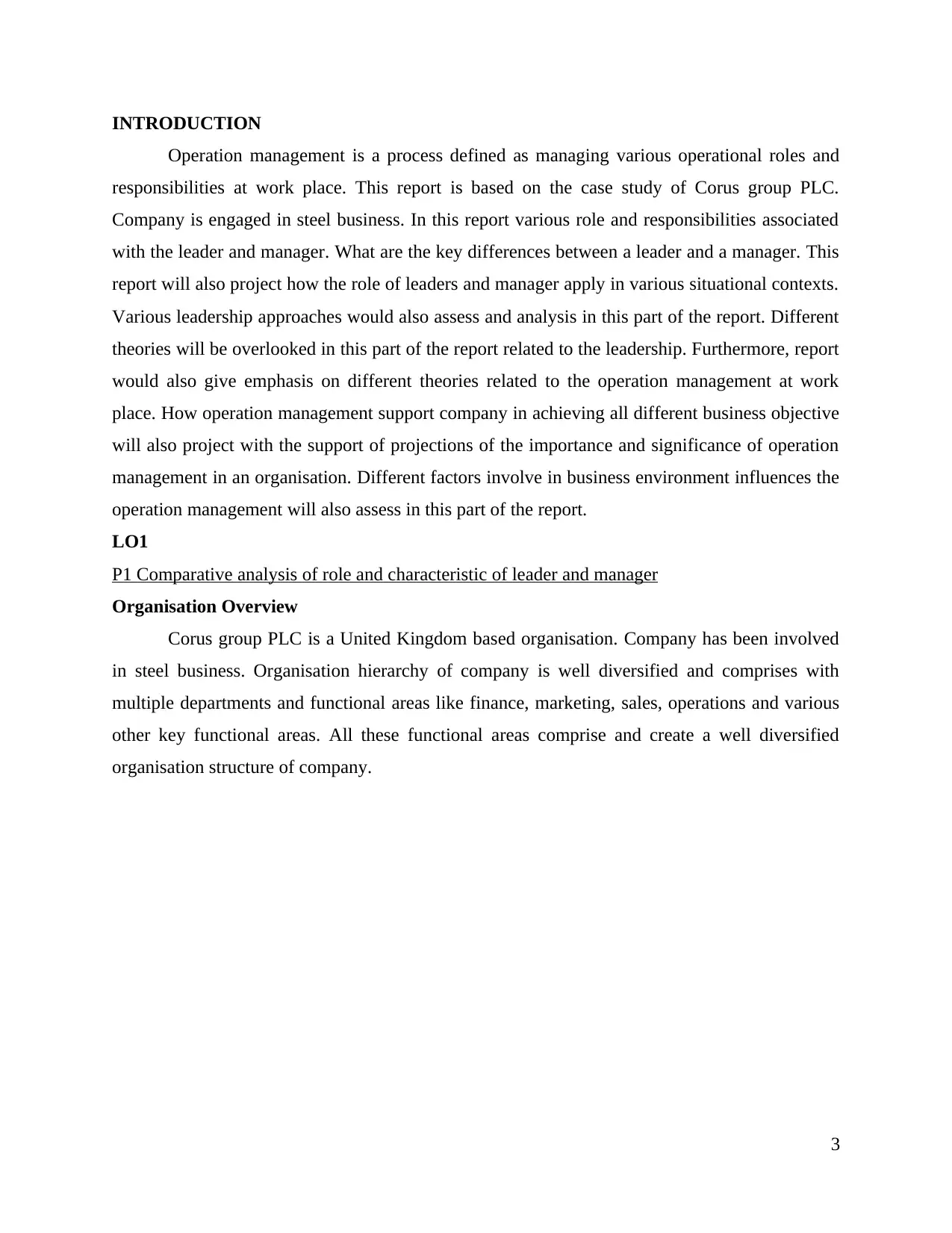
INTRODUCTION
Operation management is a process defined as managing various operational roles and
responsibilities at work place. This report is based on the case study of Corus group PLC.
Company is engaged in steel business. In this report various role and responsibilities associated
with the leader and manager. What are the key differences between a leader and a manager. This
report will also project how the role of leaders and manager apply in various situational contexts.
Various leadership approaches would also assess and analysis in this part of the report. Different
theories will be overlooked in this part of the report related to the leadership. Furthermore, report
would also give emphasis on different theories related to the operation management at work
place. How operation management support company in achieving all different business objective
will also project with the support of projections of the importance and significance of operation
management in an organisation. Different factors involve in business environment influences the
operation management will also assess in this part of the report.
LO1
P1 Comparative analysis of role and characteristic of leader and manager
Organisation Overview
Corus group PLC is a United Kingdom based organisation. Company has been involved
in steel business. Organisation hierarchy of company is well diversified and comprises with
multiple departments and functional areas like finance, marketing, sales, operations and various
other key functional areas. All these functional areas comprise and create a well diversified
organisation structure of company.
3
Operation management is a process defined as managing various operational roles and
responsibilities at work place. This report is based on the case study of Corus group PLC.
Company is engaged in steel business. In this report various role and responsibilities associated
with the leader and manager. What are the key differences between a leader and a manager. This
report will also project how the role of leaders and manager apply in various situational contexts.
Various leadership approaches would also assess and analysis in this part of the report. Different
theories will be overlooked in this part of the report related to the leadership. Furthermore, report
would also give emphasis on different theories related to the operation management at work
place. How operation management support company in achieving all different business objective
will also project with the support of projections of the importance and significance of operation
management in an organisation. Different factors involve in business environment influences the
operation management will also assess in this part of the report.
LO1
P1 Comparative analysis of role and characteristic of leader and manager
Organisation Overview
Corus group PLC is a United Kingdom based organisation. Company has been involved
in steel business. Organisation hierarchy of company is well diversified and comprises with
multiple departments and functional areas like finance, marketing, sales, operations and various
other key functional areas. All these functional areas comprise and create a well diversified
organisation structure of company.
3
⊘ This is a preview!⊘
Do you want full access?
Subscribe today to unlock all pages.

Trusted by 1+ million students worldwide
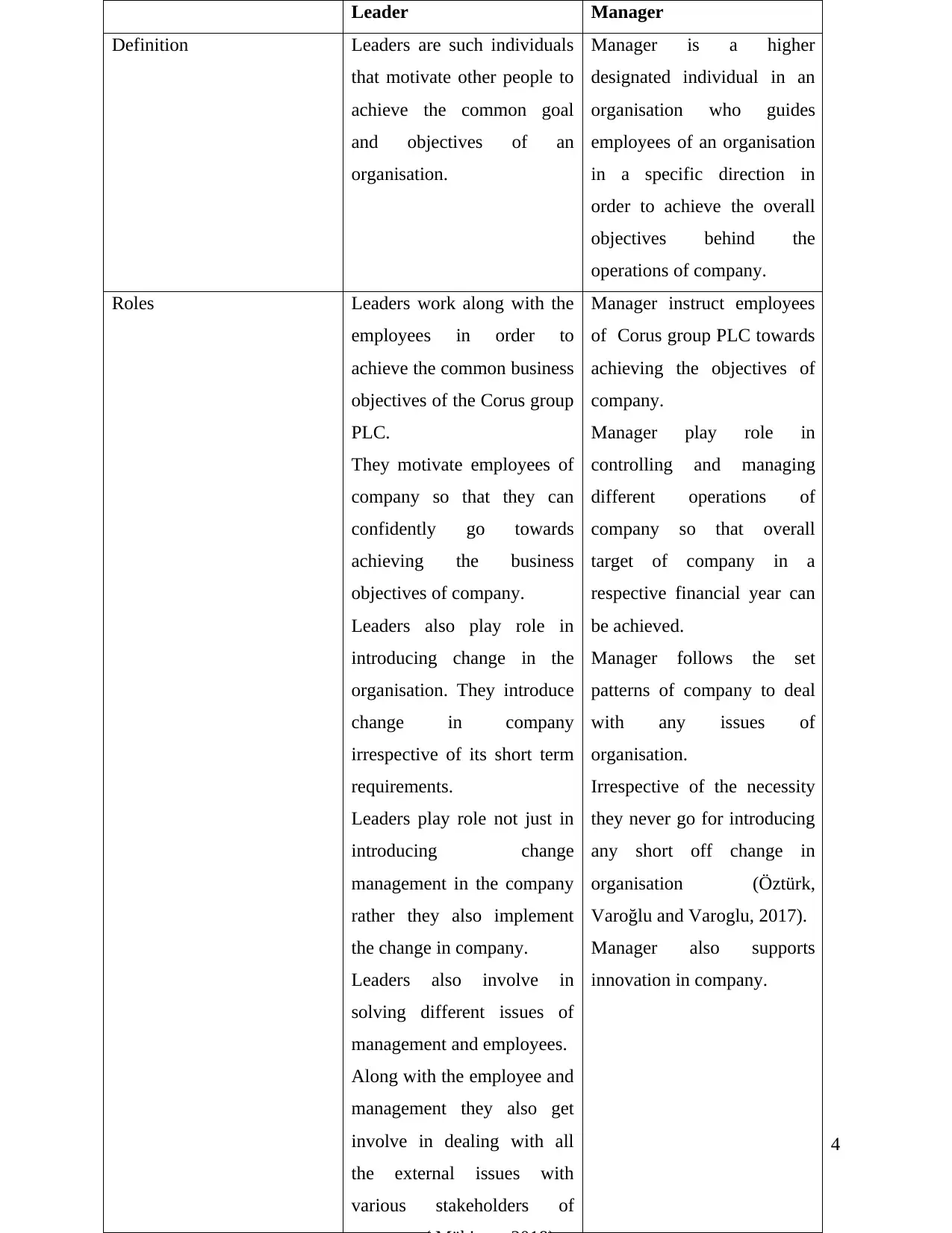
4
Leader Manager
Definition Leaders are such individuals
that motivate other people to
achieve the common goal
and objectives of an
organisation.
Manager is a higher
designated individual in an
organisation who guides
employees of an organisation
in a specific direction in
order to achieve the overall
objectives behind the
operations of company.
Roles Leaders work along with the
employees in order to
achieve the common business
objectives of the Corus group
PLC.
They motivate employees of
company so that they can
confidently go towards
achieving the business
objectives of company.
Leaders also play role in
introducing change in the
organisation. They introduce
change in company
irrespective of its short term
requirements.
Leaders play role not just in
introducing change
management in the company
rather they also implement
the change in company.
Leaders also involve in
solving different issues of
management and employees.
Along with the employee and
management they also get
involve in dealing with all
the external issues with
various stakeholders of
Manager instruct employees
of Corus group PLC towards
achieving the objectives of
company.
Manager play role in
controlling and managing
different operations of
company so that overall
target of company in a
respective financial year can
be achieved.
Manager follows the set
patterns of company to deal
with any issues of
organisation.
Irrespective of the necessity
they never go for introducing
any short off change in
organisation (Öztürk,
Varoğlu and Varoglu, 2017).
Manager also supports
innovation in company.
Leader Manager
Definition Leaders are such individuals
that motivate other people to
achieve the common goal
and objectives of an
organisation.
Manager is a higher
designated individual in an
organisation who guides
employees of an organisation
in a specific direction in
order to achieve the overall
objectives behind the
operations of company.
Roles Leaders work along with the
employees in order to
achieve the common business
objectives of the Corus group
PLC.
They motivate employees of
company so that they can
confidently go towards
achieving the business
objectives of company.
Leaders also play role in
introducing change in the
organisation. They introduce
change in company
irrespective of its short term
requirements.
Leaders play role not just in
introducing change
management in the company
rather they also implement
the change in company.
Leaders also involve in
solving different issues of
management and employees.
Along with the employee and
management they also get
involve in dealing with all
the external issues with
various stakeholders of
Manager instruct employees
of Corus group PLC towards
achieving the objectives of
company.
Manager play role in
controlling and managing
different operations of
company so that overall
target of company in a
respective financial year can
be achieved.
Manager follows the set
patterns of company to deal
with any issues of
organisation.
Irrespective of the necessity
they never go for introducing
any short off change in
organisation (Öztürk,
Varoğlu and Varoglu, 2017).
Manager also supports
innovation in company.
Paraphrase This Document
Need a fresh take? Get an instant paraphrase of this document with our AI Paraphraser
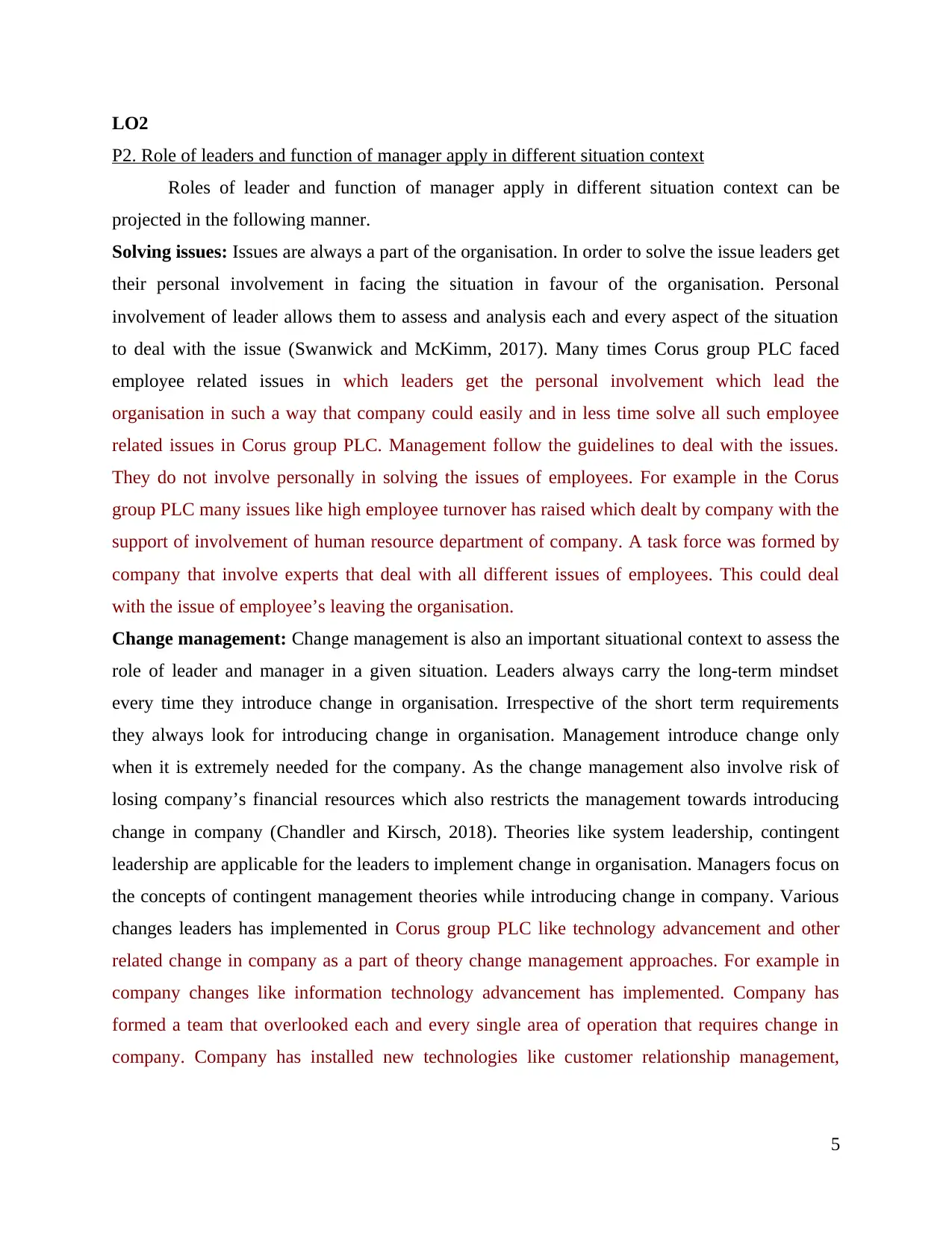
LO2
P2. Role of leaders and function of manager apply in different situation context
Roles of leader and function of manager apply in different situation context can be
projected in the following manner.
Solving issues: Issues are always a part of the organisation. In order to solve the issue leaders get
their personal involvement in facing the situation in favour of the organisation. Personal
involvement of leader allows them to assess and analysis each and every aspect of the situation
to deal with the issue (Swanwick and McKimm, 2017). Many times Corus group PLC faced
employee related issues in which leaders get the personal involvement which lead the
organisation in such a way that company could easily and in less time solve all such employee
related issues in Corus group PLC. Management follow the guidelines to deal with the issues.
They do not involve personally in solving the issues of employees. For example in the Corus
group PLC many issues like high employee turnover has raised which dealt by company with the
support of involvement of human resource department of company. A task force was formed by
company that involve experts that deal with all different issues of employees. This could deal
with the issue of employee’s leaving the organisation.
Change management: Change management is also an important situational context to assess the
role of leader and manager in a given situation. Leaders always carry the long-term mindset
every time they introduce change in organisation. Irrespective of the short term requirements
they always look for introducing change in organisation. Management introduce change only
when it is extremely needed for the company. As the change management also involve risk of
losing company’s financial resources which also restricts the management towards introducing
change in company (Chandler and Kirsch, 2018). Theories like system leadership, contingent
leadership are applicable for the leaders to implement change in organisation. Managers focus on
the concepts of contingent management theories while introducing change in company. Various
changes leaders has implemented in Corus group PLC like technology advancement and other
related change in company as a part of theory change management approaches. For example in
company changes like information technology advancement has implemented. Company has
formed a team that overlooked each and every single area of operation that requires change in
company. Company has installed new technologies like customer relationship management,
5
P2. Role of leaders and function of manager apply in different situation context
Roles of leader and function of manager apply in different situation context can be
projected in the following manner.
Solving issues: Issues are always a part of the organisation. In order to solve the issue leaders get
their personal involvement in facing the situation in favour of the organisation. Personal
involvement of leader allows them to assess and analysis each and every aspect of the situation
to deal with the issue (Swanwick and McKimm, 2017). Many times Corus group PLC faced
employee related issues in which leaders get the personal involvement which lead the
organisation in such a way that company could easily and in less time solve all such employee
related issues in Corus group PLC. Management follow the guidelines to deal with the issues.
They do not involve personally in solving the issues of employees. For example in the Corus
group PLC many issues like high employee turnover has raised which dealt by company with the
support of involvement of human resource department of company. A task force was formed by
company that involve experts that deal with all different issues of employees. This could deal
with the issue of employee’s leaving the organisation.
Change management: Change management is also an important situational context to assess the
role of leader and manager in a given situation. Leaders always carry the long-term mindset
every time they introduce change in organisation. Irrespective of the short term requirements
they always look for introducing change in organisation. Management introduce change only
when it is extremely needed for the company. As the change management also involve risk of
losing company’s financial resources which also restricts the management towards introducing
change in company (Chandler and Kirsch, 2018). Theories like system leadership, contingent
leadership are applicable for the leaders to implement change in organisation. Managers focus on
the concepts of contingent management theories while introducing change in company. Various
changes leaders has implemented in Corus group PLC like technology advancement and other
related change in company as a part of theory change management approaches. For example in
company changes like information technology advancement has implemented. Company has
formed a team that overlooked each and every single area of operation that requires change in
company. Company has installed new technologies like customer relationship management,
5
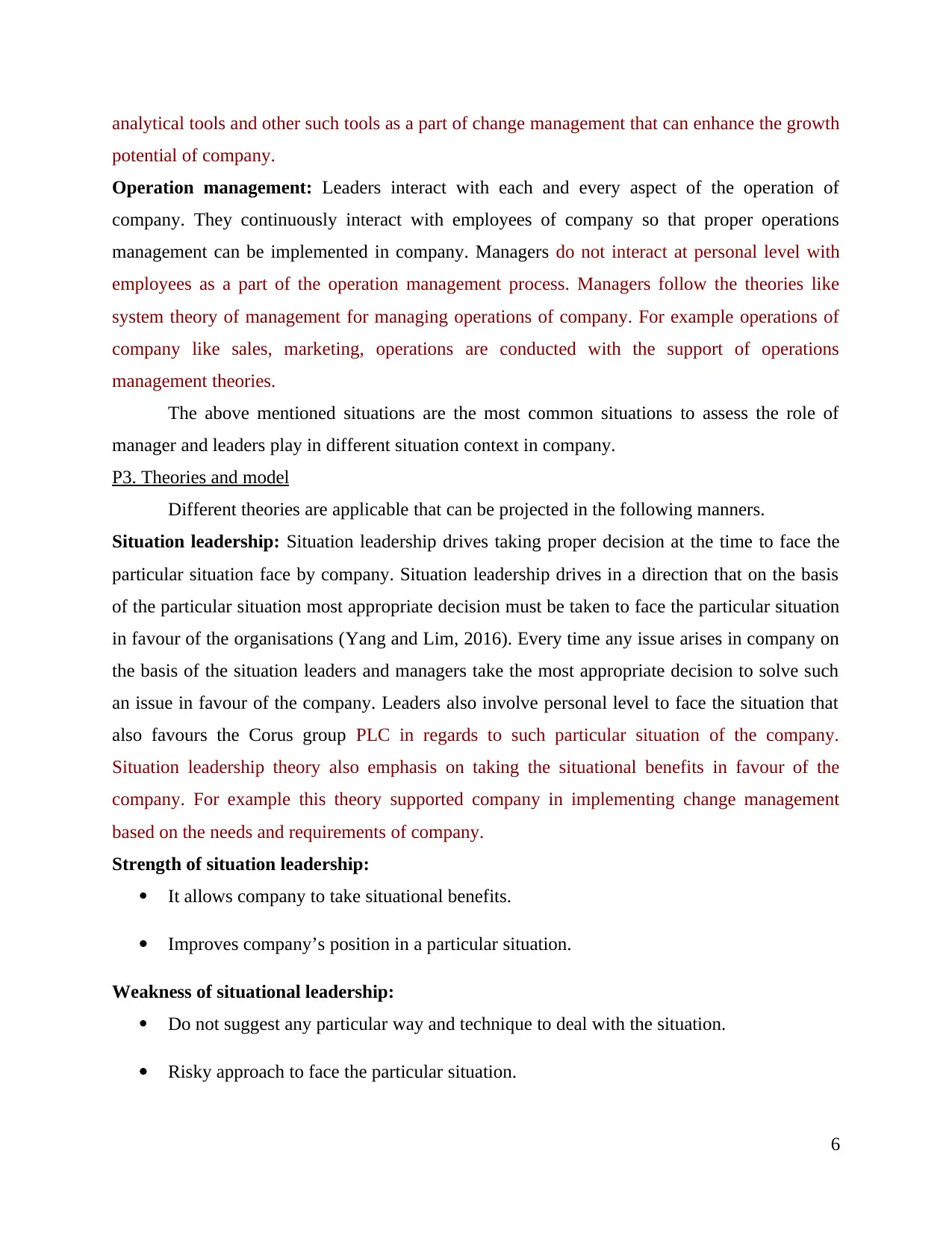
analytical tools and other such tools as a part of change management that can enhance the growth
potential of company.
Operation management: Leaders interact with each and every aspect of the operation of
company. They continuously interact with employees of company so that proper operations
management can be implemented in company. Managers do not interact at personal level with
employees as a part of the operation management process. Managers follow the theories like
system theory of management for managing operations of company. For example operations of
company like sales, marketing, operations are conducted with the support of operations
management theories.
The above mentioned situations are the most common situations to assess the role of
manager and leaders play in different situation context in company.
P3. Theories and model
Different theories are applicable that can be projected in the following manners.
Situation leadership: Situation leadership drives taking proper decision at the time to face the
particular situation face by company. Situation leadership drives in a direction that on the basis
of the particular situation most appropriate decision must be taken to face the particular situation
in favour of the organisations (Yang and Lim, 2016). Every time any issue arises in company on
the basis of the situation leaders and managers take the most appropriate decision to solve such
an issue in favour of the company. Leaders also involve personal level to face the situation that
also favours the Corus group PLC in regards to such particular situation of the company.
Situation leadership theory also emphasis on taking the situational benefits in favour of the
company. For example this theory supported company in implementing change management
based on the needs and requirements of company.
Strength of situation leadership:
It allows company to take situational benefits.
Improves company’s position in a particular situation.
Weakness of situational leadership:
Do not suggest any particular way and technique to deal with the situation.
Risky approach to face the particular situation.
6
potential of company.
Operation management: Leaders interact with each and every aspect of the operation of
company. They continuously interact with employees of company so that proper operations
management can be implemented in company. Managers do not interact at personal level with
employees as a part of the operation management process. Managers follow the theories like
system theory of management for managing operations of company. For example operations of
company like sales, marketing, operations are conducted with the support of operations
management theories.
The above mentioned situations are the most common situations to assess the role of
manager and leaders play in different situation context in company.
P3. Theories and model
Different theories are applicable that can be projected in the following manners.
Situation leadership: Situation leadership drives taking proper decision at the time to face the
particular situation face by company. Situation leadership drives in a direction that on the basis
of the particular situation most appropriate decision must be taken to face the particular situation
in favour of the organisations (Yang and Lim, 2016). Every time any issue arises in company on
the basis of the situation leaders and managers take the most appropriate decision to solve such
an issue in favour of the company. Leaders also involve personal level to face the situation that
also favours the Corus group PLC in regards to such particular situation of the company.
Situation leadership theory also emphasis on taking the situational benefits in favour of the
company. For example this theory supported company in implementing change management
based on the needs and requirements of company.
Strength of situation leadership:
It allows company to take situational benefits.
Improves company’s position in a particular situation.
Weakness of situational leadership:
Do not suggest any particular way and technique to deal with the situation.
Risky approach to face the particular situation.
6
⊘ This is a preview!⊘
Do you want full access?
Subscribe today to unlock all pages.

Trusted by 1+ million students worldwide
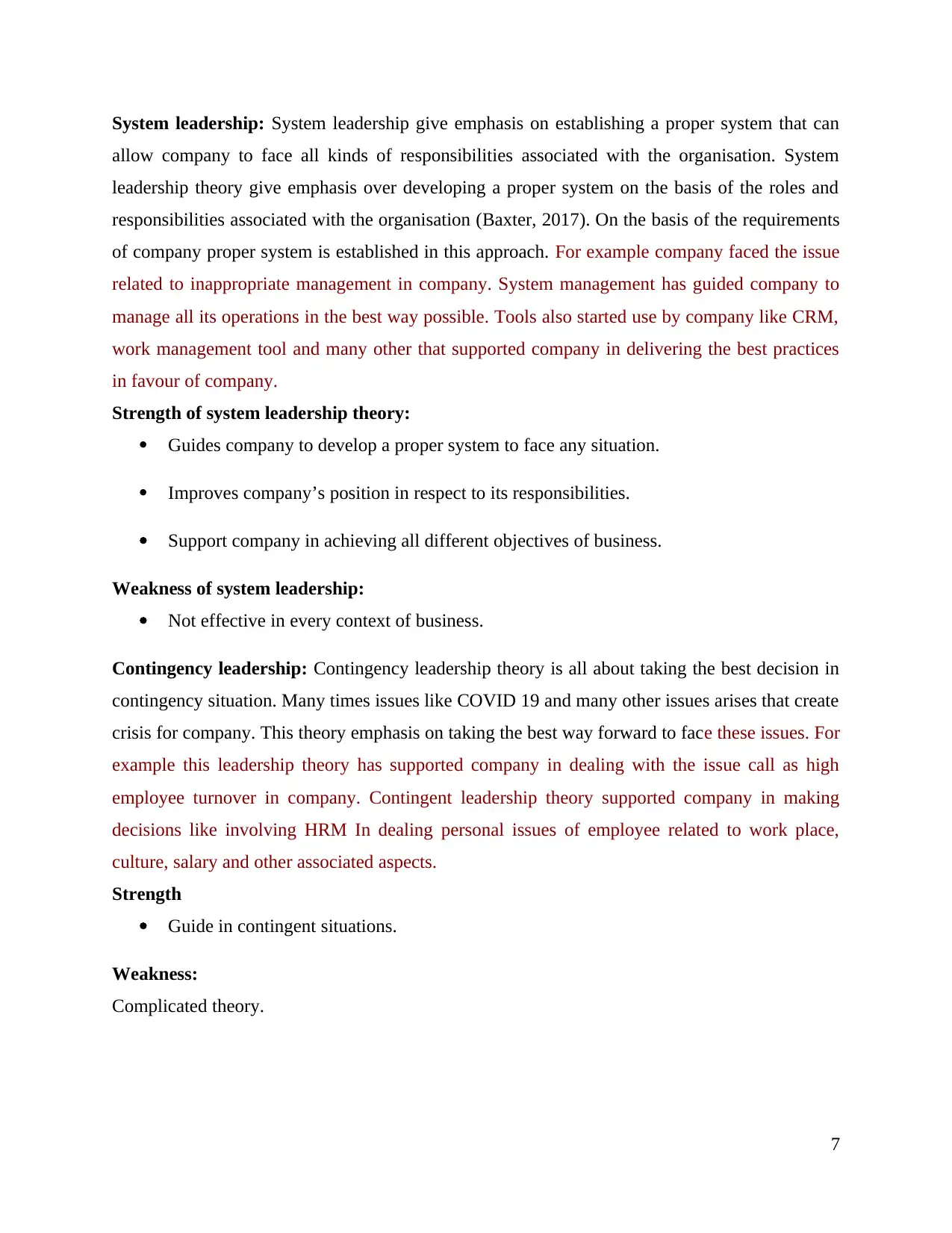
System leadership: System leadership give emphasis on establishing a proper system that can
allow company to face all kinds of responsibilities associated with the organisation. System
leadership theory give emphasis over developing a proper system on the basis of the roles and
responsibilities associated with the organisation (Baxter, 2017). On the basis of the requirements
of company proper system is established in this approach. For example company faced the issue
related to inappropriate management in company. System management has guided company to
manage all its operations in the best way possible. Tools also started use by company like CRM,
work management tool and many other that supported company in delivering the best practices
in favour of company.
Strength of system leadership theory:
Guides company to develop a proper system to face any situation.
Improves company’s position in respect to its responsibilities.
Support company in achieving all different objectives of business.
Weakness of system leadership:
Not effective in every context of business.
Contingency leadership: Contingency leadership theory is all about taking the best decision in
contingency situation. Many times issues like COVID 19 and many other issues arises that create
crisis for company. This theory emphasis on taking the best way forward to face these issues. For
example this leadership theory has supported company in dealing with the issue call as high
employee turnover in company. Contingent leadership theory supported company in making
decisions like involving HRM In dealing personal issues of employee related to work place,
culture, salary and other associated aspects.
Strength
Guide in contingent situations.
Weakness:
Complicated theory.
7
allow company to face all kinds of responsibilities associated with the organisation. System
leadership theory give emphasis over developing a proper system on the basis of the roles and
responsibilities associated with the organisation (Baxter, 2017). On the basis of the requirements
of company proper system is established in this approach. For example company faced the issue
related to inappropriate management in company. System management has guided company to
manage all its operations in the best way possible. Tools also started use by company like CRM,
work management tool and many other that supported company in delivering the best practices
in favour of company.
Strength of system leadership theory:
Guides company to develop a proper system to face any situation.
Improves company’s position in respect to its responsibilities.
Support company in achieving all different objectives of business.
Weakness of system leadership:
Not effective in every context of business.
Contingency leadership: Contingency leadership theory is all about taking the best decision in
contingency situation. Many times issues like COVID 19 and many other issues arises that create
crisis for company. This theory emphasis on taking the best way forward to face these issues. For
example this leadership theory has supported company in dealing with the issue call as high
employee turnover in company. Contingent leadership theory supported company in making
decisions like involving HRM In dealing personal issues of employee related to work place,
culture, salary and other associated aspects.
Strength
Guide in contingent situations.
Weakness:
Complicated theory.
7
Paraphrase This Document
Need a fresh take? Get an instant paraphrase of this document with our AI Paraphraser
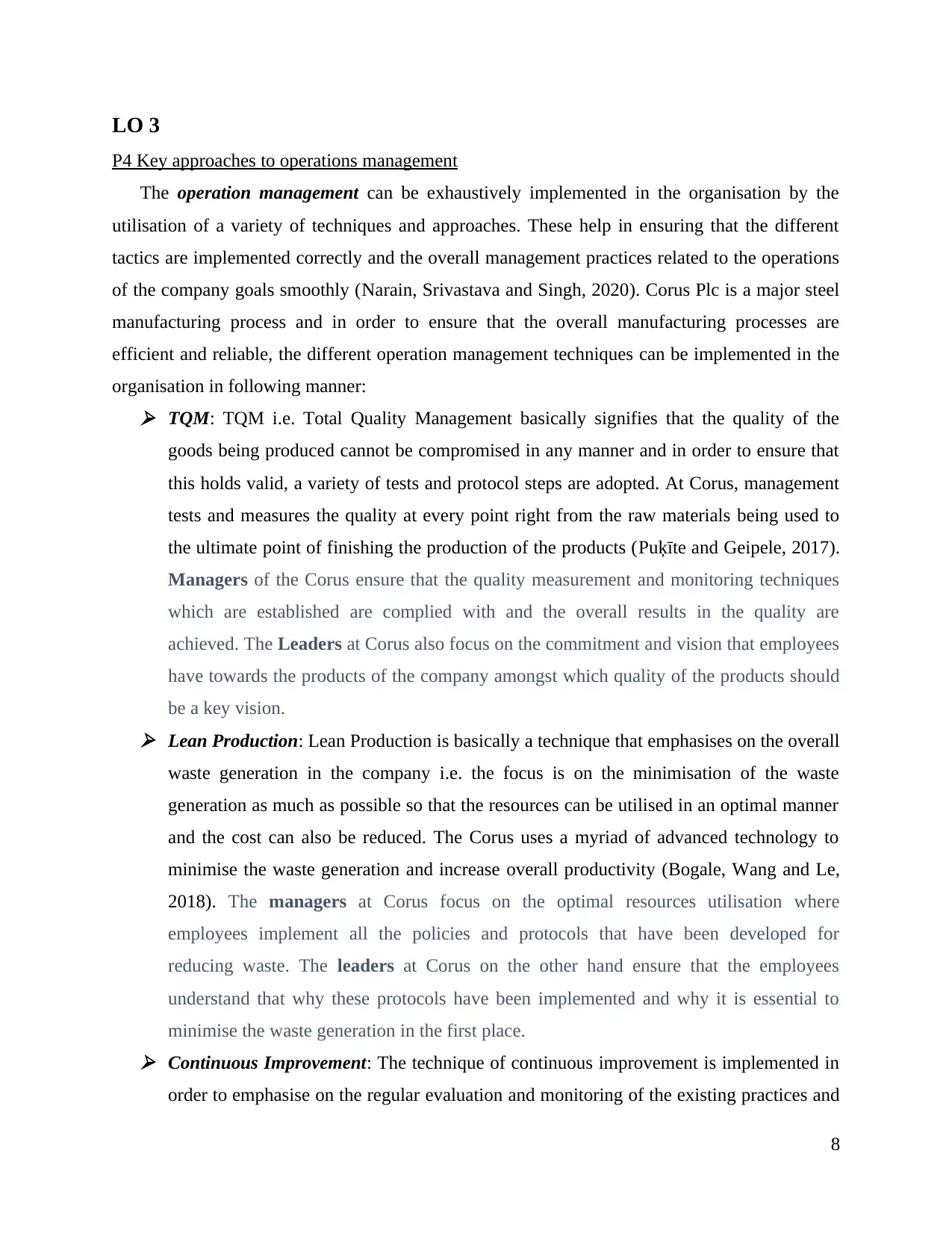
LO 3
P4 Key approaches to operations management
The operation management can be exhaustively implemented in the organisation by the
utilisation of a variety of techniques and approaches. These help in ensuring that the different
tactics are implemented correctly and the overall management practices related to the operations
of the company goals smoothly (Narain, Srivastava and Singh, 2020). Corus Plc is a major steel
manufacturing process and in order to ensure that the overall manufacturing processes are
efficient and reliable, the different operation management techniques can be implemented in the
organisation in following manner: TQM: TQM i.e. Total Quality Management basically signifies that the quality of the
goods being produced cannot be compromised in any manner and in order to ensure that
this holds valid, a variety of tests and protocol steps are adopted. At Corus, management
tests and measures the quality at every point right from the raw materials being used to
the ultimate point of finishing the production of the products (Puķīte and Geipele, 2017).
Managers of the Corus ensure that the quality measurement and monitoring techniques
which are established are complied with and the overall results in the quality are
achieved. The Leaders at Corus also focus on the commitment and vision that employees
have towards the products of the company amongst which quality of the products should
be a key vision. Lean Production: Lean Production is basically a technique that emphasises on the overall
waste generation in the company i.e. the focus is on the minimisation of the waste
generation as much as possible so that the resources can be utilised in an optimal manner
and the cost can also be reduced. The Corus uses a myriad of advanced technology to
minimise the waste generation and increase overall productivity (Bogale, Wang and Le,
2018). The managers at Corus focus on the optimal resources utilisation where
employees implement all the policies and protocols that have been developed for
reducing waste. The leaders at Corus on the other hand ensure that the employees
understand that why these protocols have been implemented and why it is essential to
minimise the waste generation in the first place. Continuous Improvement: The technique of continuous improvement is implemented in
order to emphasise on the regular evaluation and monitoring of the existing practices and
8
P4 Key approaches to operations management
The operation management can be exhaustively implemented in the organisation by the
utilisation of a variety of techniques and approaches. These help in ensuring that the different
tactics are implemented correctly and the overall management practices related to the operations
of the company goals smoothly (Narain, Srivastava and Singh, 2020). Corus Plc is a major steel
manufacturing process and in order to ensure that the overall manufacturing processes are
efficient and reliable, the different operation management techniques can be implemented in the
organisation in following manner: TQM: TQM i.e. Total Quality Management basically signifies that the quality of the
goods being produced cannot be compromised in any manner and in order to ensure that
this holds valid, a variety of tests and protocol steps are adopted. At Corus, management
tests and measures the quality at every point right from the raw materials being used to
the ultimate point of finishing the production of the products (Puķīte and Geipele, 2017).
Managers of the Corus ensure that the quality measurement and monitoring techniques
which are established are complied with and the overall results in the quality are
achieved. The Leaders at Corus also focus on the commitment and vision that employees
have towards the products of the company amongst which quality of the products should
be a key vision. Lean Production: Lean Production is basically a technique that emphasises on the overall
waste generation in the company i.e. the focus is on the minimisation of the waste
generation as much as possible so that the resources can be utilised in an optimal manner
and the cost can also be reduced. The Corus uses a myriad of advanced technology to
minimise the waste generation and increase overall productivity (Bogale, Wang and Le,
2018). The managers at Corus focus on the optimal resources utilisation where
employees implement all the policies and protocols that have been developed for
reducing waste. The leaders at Corus on the other hand ensure that the employees
understand that why these protocols have been implemented and why it is essential to
minimise the waste generation in the first place. Continuous Improvement: The technique of continuous improvement is implemented in
order to emphasise on the regular evaluation and monitoring of the existing practices and
8
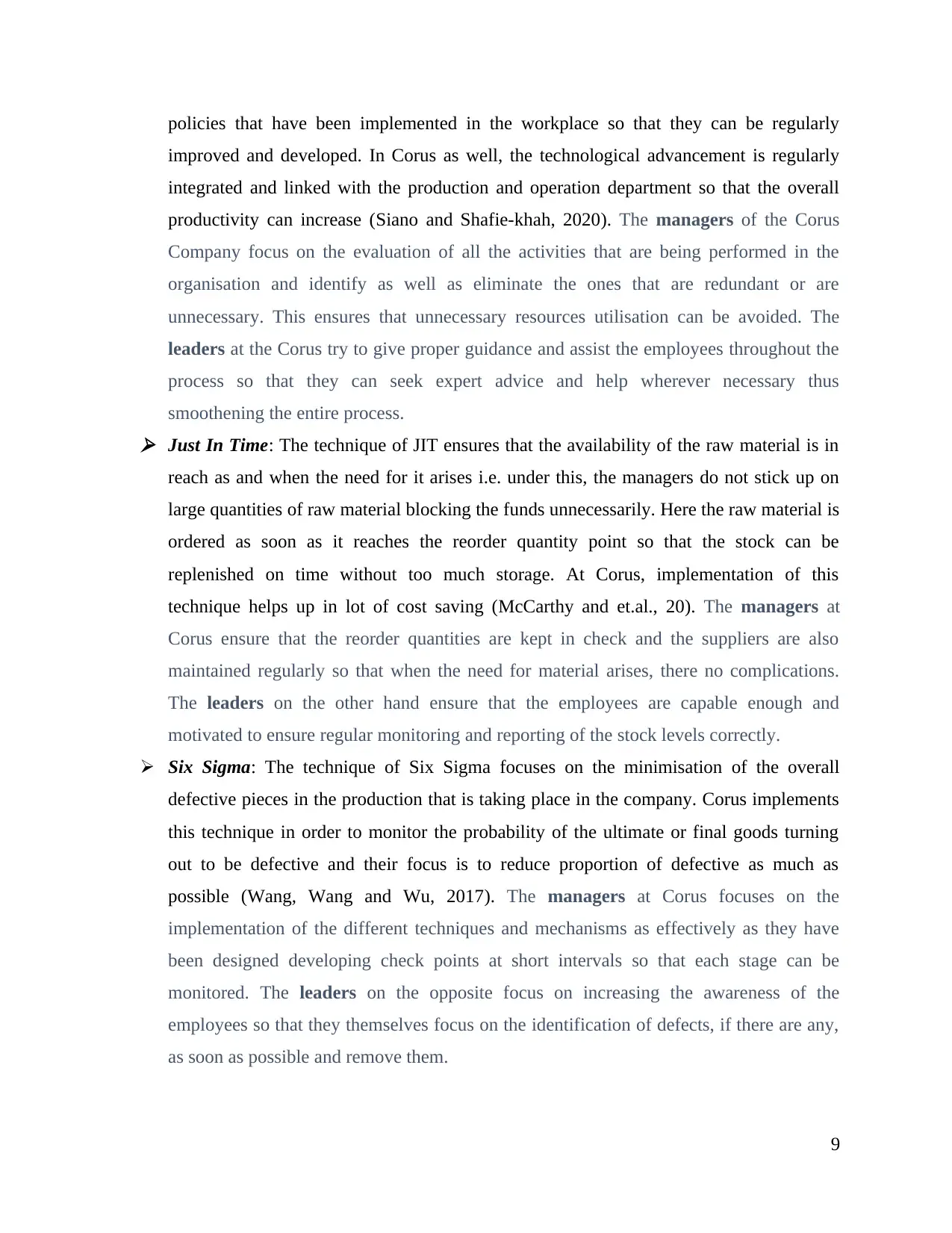
policies that have been implemented in the workplace so that they can be regularly
improved and developed. In Corus as well, the technological advancement is regularly
integrated and linked with the production and operation department so that the overall
productivity can increase (Siano and Shafie-khah, 2020). The managers of the Corus
Company focus on the evaluation of all the activities that are being performed in the
organisation and identify as well as eliminate the ones that are redundant or are
unnecessary. This ensures that unnecessary resources utilisation can be avoided. The
leaders at the Corus try to give proper guidance and assist the employees throughout the
process so that they can seek expert advice and help wherever necessary thus
smoothening the entire process. Just In Time: The technique of JIT ensures that the availability of the raw material is in
reach as and when the need for it arises i.e. under this, the managers do not stick up on
large quantities of raw material blocking the funds unnecessarily. Here the raw material is
ordered as soon as it reaches the reorder quantity point so that the stock can be
replenished on time without too much storage. At Corus, implementation of this
technique helps up in lot of cost saving (McCarthy and et.al., 20). The managers at
Corus ensure that the reorder quantities are kept in check and the suppliers are also
maintained regularly so that when the need for material arises, there no complications.
The leaders on the other hand ensure that the employees are capable enough and
motivated to ensure regular monitoring and reporting of the stock levels correctly.
Six Sigma: The technique of Six Sigma focuses on the minimisation of the overall
defective pieces in the production that is taking place in the company. Corus implements
this technique in order to monitor the probability of the ultimate or final goods turning
out to be defective and their focus is to reduce proportion of defective as much as
possible (Wang, Wang and Wu, 2017). The managers at Corus focuses on the
implementation of the different techniques and mechanisms as effectively as they have
been designed developing check points at short intervals so that each stage can be
monitored. The leaders on the opposite focus on increasing the awareness of the
employees so that they themselves focus on the identification of defects, if there are any,
as soon as possible and remove them.
9
improved and developed. In Corus as well, the technological advancement is regularly
integrated and linked with the production and operation department so that the overall
productivity can increase (Siano and Shafie-khah, 2020). The managers of the Corus
Company focus on the evaluation of all the activities that are being performed in the
organisation and identify as well as eliminate the ones that are redundant or are
unnecessary. This ensures that unnecessary resources utilisation can be avoided. The
leaders at the Corus try to give proper guidance and assist the employees throughout the
process so that they can seek expert advice and help wherever necessary thus
smoothening the entire process. Just In Time: The technique of JIT ensures that the availability of the raw material is in
reach as and when the need for it arises i.e. under this, the managers do not stick up on
large quantities of raw material blocking the funds unnecessarily. Here the raw material is
ordered as soon as it reaches the reorder quantity point so that the stock can be
replenished on time without too much storage. At Corus, implementation of this
technique helps up in lot of cost saving (McCarthy and et.al., 20). The managers at
Corus ensure that the reorder quantities are kept in check and the suppliers are also
maintained regularly so that when the need for material arises, there no complications.
The leaders on the other hand ensure that the employees are capable enough and
motivated to ensure regular monitoring and reporting of the stock levels correctly.
Six Sigma: The technique of Six Sigma focuses on the minimisation of the overall
defective pieces in the production that is taking place in the company. Corus implements
this technique in order to monitor the probability of the ultimate or final goods turning
out to be defective and their focus is to reduce proportion of defective as much as
possible (Wang, Wang and Wu, 2017). The managers at Corus focuses on the
implementation of the different techniques and mechanisms as effectively as they have
been designed developing check points at short intervals so that each stage can be
monitored. The leaders on the opposite focus on increasing the awareness of the
employees so that they themselves focus on the identification of defects, if there are any,
as soon as possible and remove them.
9
⊘ This is a preview!⊘
Do you want full access?
Subscribe today to unlock all pages.

Trusted by 1+ million students worldwide
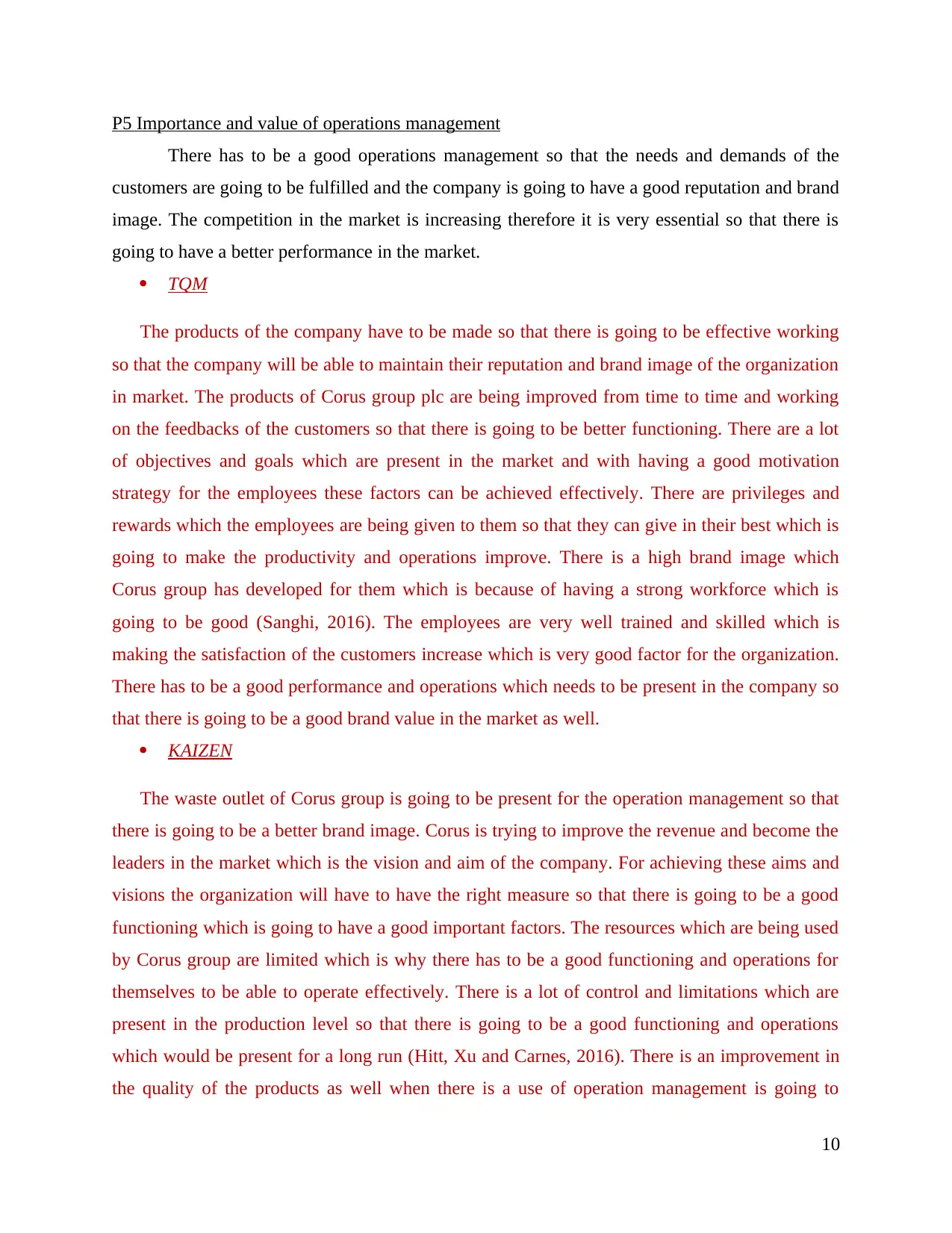
P5 Importance and value of operations management
There has to be a good operations management so that the needs and demands of the
customers are going to be fulfilled and the company is going to have a good reputation and brand
image. The competition in the market is increasing therefore it is very essential so that there is
going to have a better performance in the market.
TQM
The products of the company have to be made so that there is going to be effective working
so that the company will be able to maintain their reputation and brand image of the organization
in market. The products of Corus group plc are being improved from time to time and working
on the feedbacks of the customers so that there is going to be better functioning. There are a lot
of objectives and goals which are present in the market and with having a good motivation
strategy for the employees these factors can be achieved effectively. There are privileges and
rewards which the employees are being given to them so that they can give in their best which is
going to make the productivity and operations improve. There is a high brand image which
Corus group has developed for them which is because of having a strong workforce which is
going to be good (Sanghi, 2016). The employees are very well trained and skilled which is
making the satisfaction of the customers increase which is very good factor for the organization.
There has to be a good performance and operations which needs to be present in the company so
that there is going to be a good brand value in the market as well.
KAIZEN
The waste outlet of Corus group is going to be present for the operation management so that
there is going to be a better brand image. Corus is trying to improve the revenue and become the
leaders in the market which is the vision and aim of the company. For achieving these aims and
visions the organization will have to have the right measure so that there is going to be a good
functioning which is going to have a good important factors. The resources which are being used
by Corus group are limited which is why there has to be a good functioning and operations for
themselves to be able to operate effectively. There is a lot of control and limitations which are
present in the production level so that there is going to be a good functioning and operations
which would be present for a long run (Hitt, Xu and Carnes, 2016). There is an improvement in
the quality of the products as well when there is a use of operation management is going to
10
There has to be a good operations management so that the needs and demands of the
customers are going to be fulfilled and the company is going to have a good reputation and brand
image. The competition in the market is increasing therefore it is very essential so that there is
going to have a better performance in the market.
TQM
The products of the company have to be made so that there is going to be effective working
so that the company will be able to maintain their reputation and brand image of the organization
in market. The products of Corus group plc are being improved from time to time and working
on the feedbacks of the customers so that there is going to be better functioning. There are a lot
of objectives and goals which are present in the market and with having a good motivation
strategy for the employees these factors can be achieved effectively. There are privileges and
rewards which the employees are being given to them so that they can give in their best which is
going to make the productivity and operations improve. There is a high brand image which
Corus group has developed for them which is because of having a strong workforce which is
going to be good (Sanghi, 2016). The employees are very well trained and skilled which is
making the satisfaction of the customers increase which is very good factor for the organization.
There has to be a good performance and operations which needs to be present in the company so
that there is going to be a good brand value in the market as well.
KAIZEN
The waste outlet of Corus group is going to be present for the operation management so that
there is going to be a better brand image. Corus is trying to improve the revenue and become the
leaders in the market which is the vision and aim of the company. For achieving these aims and
visions the organization will have to have the right measure so that there is going to be a good
functioning which is going to have a good important factors. The resources which are being used
by Corus group are limited which is why there has to be a good functioning and operations for
themselves to be able to operate effectively. There is a lot of control and limitations which are
present in the production level so that there is going to be a good functioning and operations
which would be present for a long run (Hitt, Xu and Carnes, 2016). There is an improvement in
the quality of the products as well when there is a use of operation management is going to
10
Paraphrase This Document
Need a fresh take? Get an instant paraphrase of this document with our AI Paraphraser
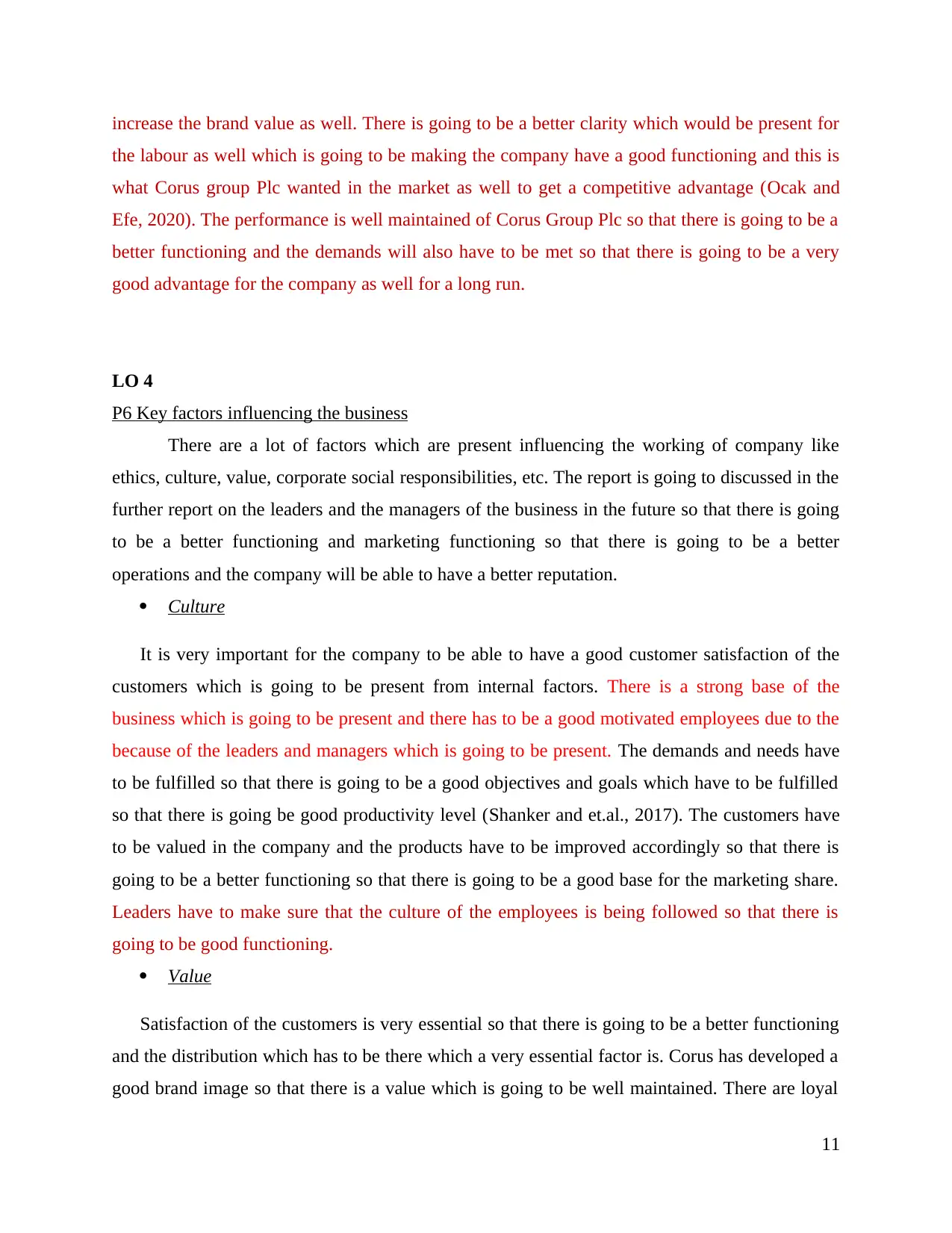
increase the brand value as well. There is going to be a better clarity which would be present for
the labour as well which is going to be making the company have a good functioning and this is
what Corus group Plc wanted in the market as well to get a competitive advantage (Ocak and
Efe, 2020). The performance is well maintained of Corus Group Plc so that there is going to be a
better functioning and the demands will also have to be met so that there is going to be a very
good advantage for the company as well for a long run.
LO 4
P6 Key factors influencing the business
There are a lot of factors which are present influencing the working of company like
ethics, culture, value, corporate social responsibilities, etc. The report is going to discussed in the
further report on the leaders and the managers of the business in the future so that there is going
to be a better functioning and marketing functioning so that there is going to be a better
operations and the company will be able to have a better reputation.
Culture
It is very important for the company to be able to have a good customer satisfaction of the
customers which is going to be present from internal factors. There is a strong base of the
business which is going to be present and there has to be a good motivated employees due to the
because of the leaders and managers which is going to be present. The demands and needs have
to be fulfilled so that there is going to be a good objectives and goals which have to be fulfilled
so that there is going be good productivity level (Shanker and et.al., 2017). The customers have
to be valued in the company and the products have to be improved accordingly so that there is
going to be a better functioning so that there is going to be a good base for the marketing share.
Leaders have to make sure that the culture of the employees is being followed so that there is
going to be good functioning.
Value
Satisfaction of the customers is very essential so that there is going to be a better functioning
and the distribution which has to be there which a very essential factor is. Corus has developed a
good brand image so that there is a value which is going to be well maintained. There are loyal
11
the labour as well which is going to be making the company have a good functioning and this is
what Corus group Plc wanted in the market as well to get a competitive advantage (Ocak and
Efe, 2020). The performance is well maintained of Corus Group Plc so that there is going to be a
better functioning and the demands will also have to be met so that there is going to be a very
good advantage for the company as well for a long run.
LO 4
P6 Key factors influencing the business
There are a lot of factors which are present influencing the working of company like
ethics, culture, value, corporate social responsibilities, etc. The report is going to discussed in the
further report on the leaders and the managers of the business in the future so that there is going
to be a better functioning and marketing functioning so that there is going to be a better
operations and the company will be able to have a better reputation.
Culture
It is very important for the company to be able to have a good customer satisfaction of the
customers which is going to be present from internal factors. There is a strong base of the
business which is going to be present and there has to be a good motivated employees due to the
because of the leaders and managers which is going to be present. The demands and needs have
to be fulfilled so that there is going to be a good objectives and goals which have to be fulfilled
so that there is going be good productivity level (Shanker and et.al., 2017). The customers have
to be valued in the company and the products have to be improved accordingly so that there is
going to be a better functioning so that there is going to be a good base for the marketing share.
Leaders have to make sure that the culture of the employees is being followed so that there is
going to be good functioning.
Value
Satisfaction of the customers is very essential so that there is going to be a better functioning
and the distribution which has to be there which a very essential factor is. Corus has developed a
good brand image so that there is a value which is going to be well maintained. There are loyal
11
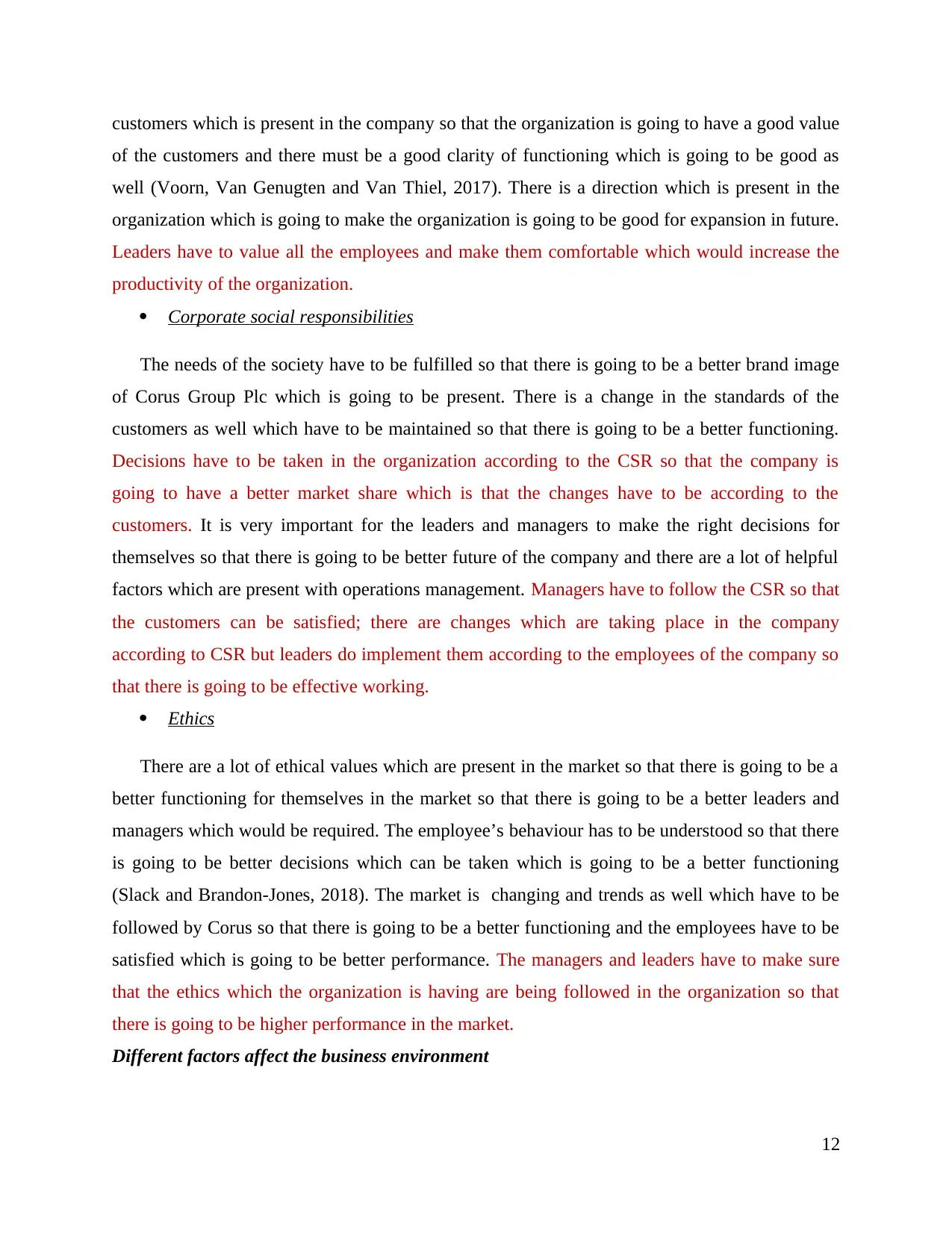
customers which is present in the company so that the organization is going to have a good value
of the customers and there must be a good clarity of functioning which is going to be good as
well (Voorn, Van Genugten and Van Thiel, 2017). There is a direction which is present in the
organization which is going to make the organization is going to be good for expansion in future.
Leaders have to value all the employees and make them comfortable which would increase the
productivity of the organization.
Corporate social responsibilities
The needs of the society have to be fulfilled so that there is going to be a better brand image
of Corus Group Plc which is going to be present. There is a change in the standards of the
customers as well which have to be maintained so that there is going to be a better functioning.
Decisions have to be taken in the organization according to the CSR so that the company is
going to have a better market share which is that the changes have to be according to the
customers. It is very important for the leaders and managers to make the right decisions for
themselves so that there is going to be better future of the company and there are a lot of helpful
factors which are present with operations management. Managers have to follow the CSR so that
the customers can be satisfied; there are changes which are taking place in the company
according to CSR but leaders do implement them according to the employees of the company so
that there is going to be effective working.
Ethics
There are a lot of ethical values which are present in the market so that there is going to be a
better functioning for themselves in the market so that there is going to be a better leaders and
managers which would be required. The employee’s behaviour has to be understood so that there
is going to be better decisions which can be taken which is going to be a better functioning
(Slack and Brandon-Jones, 2018). The market is changing and trends as well which have to be
followed by Corus so that there is going to be a better functioning and the employees have to be
satisfied which is going to be better performance. The managers and leaders have to make sure
that the ethics which the organization is having are being followed in the organization so that
there is going to be higher performance in the market.
Different factors affect the business environment
12
of the customers and there must be a good clarity of functioning which is going to be good as
well (Voorn, Van Genugten and Van Thiel, 2017). There is a direction which is present in the
organization which is going to make the organization is going to be good for expansion in future.
Leaders have to value all the employees and make them comfortable which would increase the
productivity of the organization.
Corporate social responsibilities
The needs of the society have to be fulfilled so that there is going to be a better brand image
of Corus Group Plc which is going to be present. There is a change in the standards of the
customers as well which have to be maintained so that there is going to be a better functioning.
Decisions have to be taken in the organization according to the CSR so that the company is
going to have a better market share which is that the changes have to be according to the
customers. It is very important for the leaders and managers to make the right decisions for
themselves so that there is going to be better future of the company and there are a lot of helpful
factors which are present with operations management. Managers have to follow the CSR so that
the customers can be satisfied; there are changes which are taking place in the company
according to CSR but leaders do implement them according to the employees of the company so
that there is going to be effective working.
Ethics
There are a lot of ethical values which are present in the market so that there is going to be a
better functioning for themselves in the market so that there is going to be a better leaders and
managers which would be required. The employee’s behaviour has to be understood so that there
is going to be better decisions which can be taken which is going to be a better functioning
(Slack and Brandon-Jones, 2018). The market is changing and trends as well which have to be
followed by Corus so that there is going to be a better functioning and the employees have to be
satisfied which is going to be better performance. The managers and leaders have to make sure
that the ethics which the organization is having are being followed in the organization so that
there is going to be higher performance in the market.
Different factors affect the business environment
12
⊘ This is a preview!⊘
Do you want full access?
Subscribe today to unlock all pages.

Trusted by 1+ million students worldwide
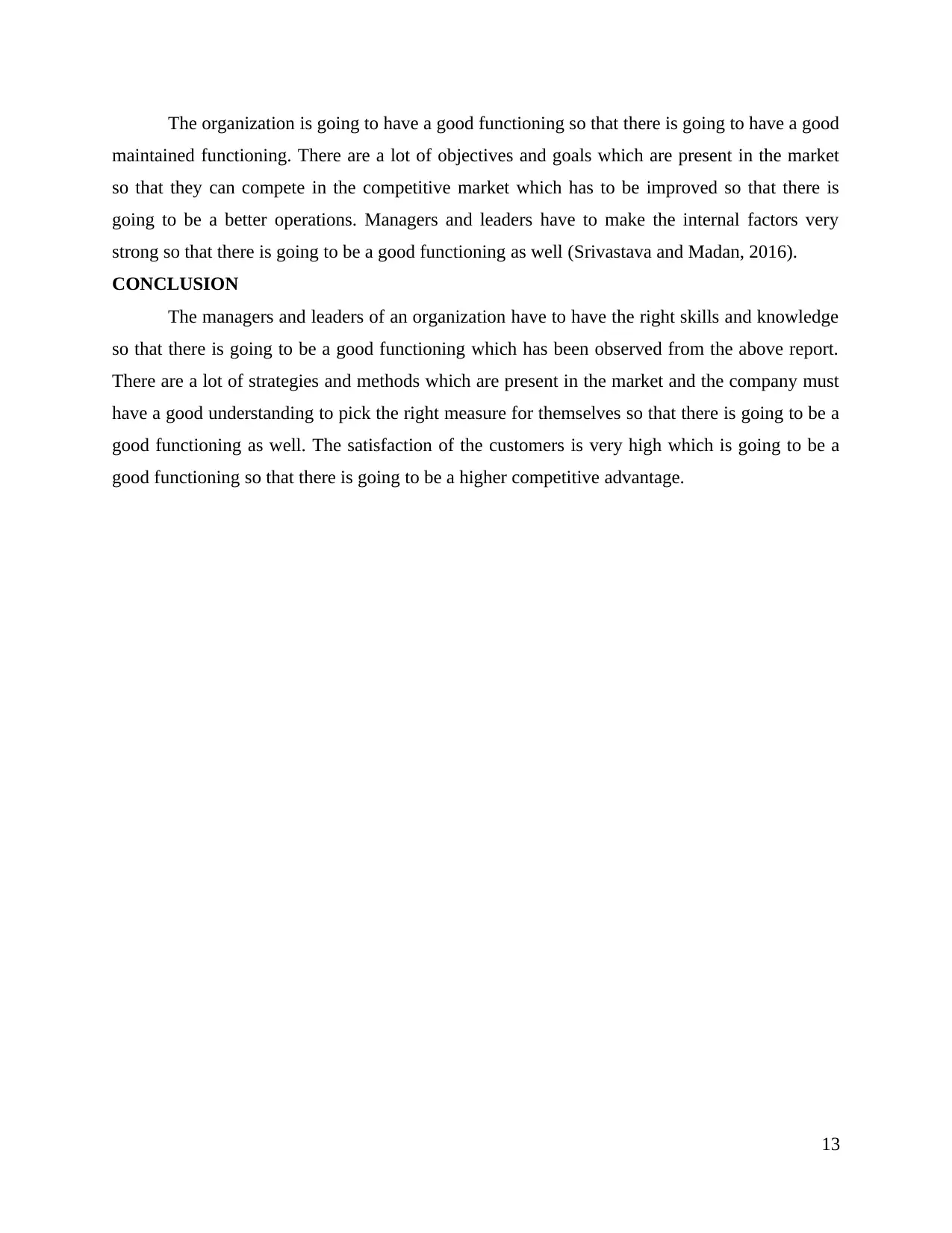
The organization is going to have a good functioning so that there is going to have a good
maintained functioning. There are a lot of objectives and goals which are present in the market
so that they can compete in the competitive market which has to be improved so that there is
going to be a better operations. Managers and leaders have to make the internal factors very
strong so that there is going to be a good functioning as well (Srivastava and Madan, 2016).
CONCLUSION
The managers and leaders of an organization have to have the right skills and knowledge
so that there is going to be a good functioning which has been observed from the above report.
There are a lot of strategies and methods which are present in the market and the company must
have a good understanding to pick the right measure for themselves so that there is going to be a
good functioning as well. The satisfaction of the customers is very high which is going to be a
good functioning so that there is going to be a higher competitive advantage.
13
maintained functioning. There are a lot of objectives and goals which are present in the market
so that they can compete in the competitive market which has to be improved so that there is
going to be a better operations. Managers and leaders have to make the internal factors very
strong so that there is going to be a good functioning as well (Srivastava and Madan, 2016).
CONCLUSION
The managers and leaders of an organization have to have the right skills and knowledge
so that there is going to be a good functioning which has been observed from the above report.
There are a lot of strategies and methods which are present in the market and the company must
have a good understanding to pick the right measure for themselves so that there is going to be a
good functioning as well. The satisfaction of the customers is very high which is going to be a
good functioning so that there is going to be a higher competitive advantage.
13
Paraphrase This Document
Need a fresh take? Get an instant paraphrase of this document with our AI Paraphraser
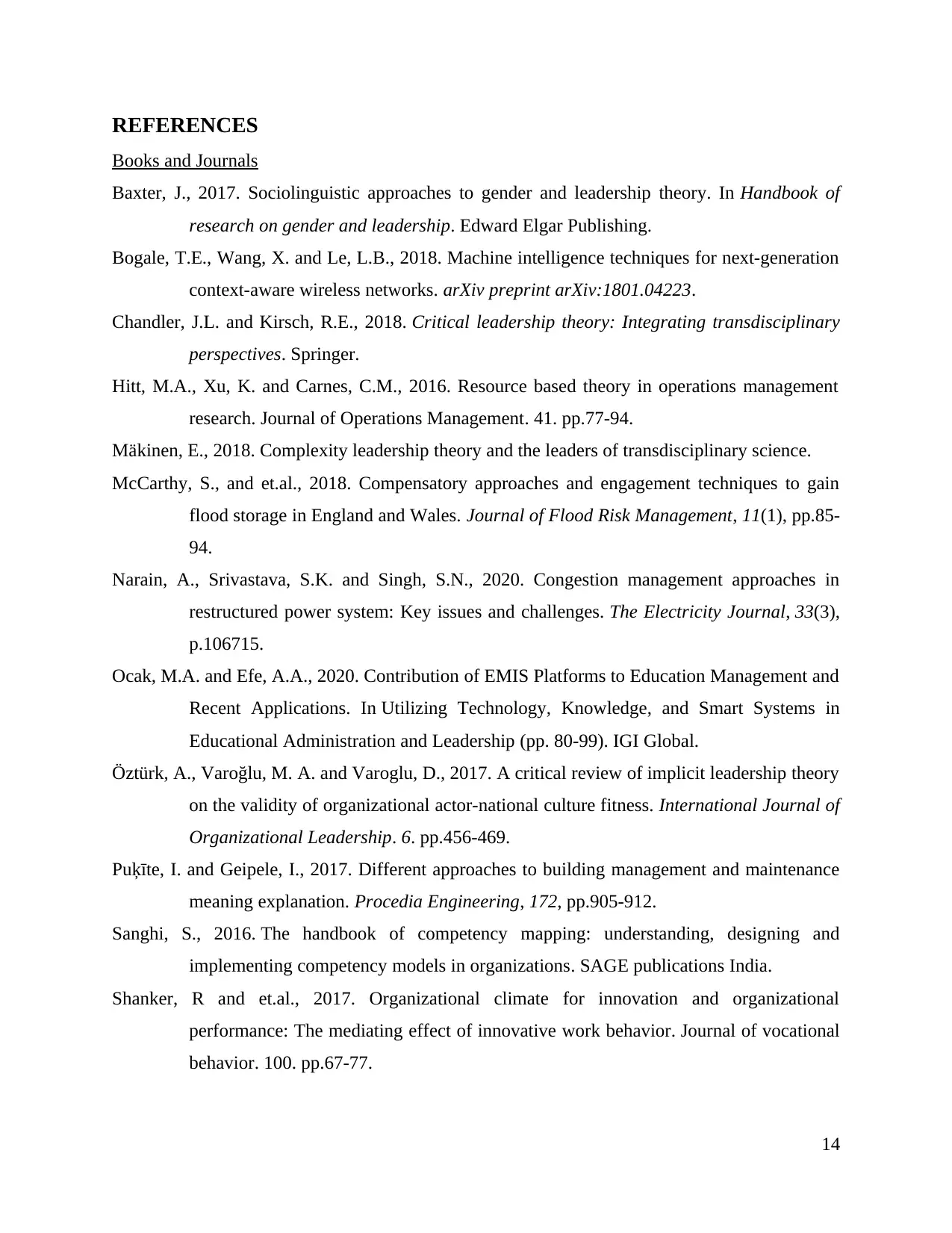
REFERENCES
Books and Journals
Baxter, J., 2017. Sociolinguistic approaches to gender and leadership theory. In Handbook of
research on gender and leadership. Edward Elgar Publishing.
Bogale, T.E., Wang, X. and Le, L.B., 2018. Machine intelligence techniques for next-generation
context-aware wireless networks. arXiv preprint arXiv:1801.04223.
Chandler, J.L. and Kirsch, R.E., 2018. Critical leadership theory: Integrating transdisciplinary
perspectives. Springer.
Hitt, M.A., Xu, K. and Carnes, C.M., 2016. Resource based theory in operations management
research. Journal of Operations Management. 41. pp.77-94.
Mäkinen, E., 2018. Complexity leadership theory and the leaders of transdisciplinary science.
McCarthy, S., and et.al., 2018. Compensatory approaches and engagement techniques to gain
flood storage in England and Wales. Journal of Flood Risk Management, 11(1), pp.85-
94.
Narain, A., Srivastava, S.K. and Singh, S.N., 2020. Congestion management approaches in
restructured power system: Key issues and challenges. The Electricity Journal, 33(3),
p.106715.
Ocak, M.A. and Efe, A.A., 2020. Contribution of EMIS Platforms to Education Management and
Recent Applications. In Utilizing Technology, Knowledge, and Smart Systems in
Educational Administration and Leadership (pp. 80-99). IGI Global.
Öztürk, A., Varoğlu, M. A. and Varoglu, D., 2017. A critical review of implicit leadership theory
on the validity of organizational actor-national culture fitness. International Journal of
Organizational Leadership. 6. pp.456-469.
Puķīte, I. and Geipele, I., 2017. Different approaches to building management and maintenance
meaning explanation. Procedia Engineering, 172, pp.905-912.
Sanghi, S., 2016. The handbook of competency mapping: understanding, designing and
implementing competency models in organizations. SAGE publications India.
Shanker, R and et.al., 2017. Organizational climate for innovation and organizational
performance: The mediating effect of innovative work behavior. Journal of vocational
behavior. 100. pp.67-77.
14
Books and Journals
Baxter, J., 2017. Sociolinguistic approaches to gender and leadership theory. In Handbook of
research on gender and leadership. Edward Elgar Publishing.
Bogale, T.E., Wang, X. and Le, L.B., 2018. Machine intelligence techniques for next-generation
context-aware wireless networks. arXiv preprint arXiv:1801.04223.
Chandler, J.L. and Kirsch, R.E., 2018. Critical leadership theory: Integrating transdisciplinary
perspectives. Springer.
Hitt, M.A., Xu, K. and Carnes, C.M., 2016. Resource based theory in operations management
research. Journal of Operations Management. 41. pp.77-94.
Mäkinen, E., 2018. Complexity leadership theory and the leaders of transdisciplinary science.
McCarthy, S., and et.al., 2018. Compensatory approaches and engagement techniques to gain
flood storage in England and Wales. Journal of Flood Risk Management, 11(1), pp.85-
94.
Narain, A., Srivastava, S.K. and Singh, S.N., 2020. Congestion management approaches in
restructured power system: Key issues and challenges. The Electricity Journal, 33(3),
p.106715.
Ocak, M.A. and Efe, A.A., 2020. Contribution of EMIS Platforms to Education Management and
Recent Applications. In Utilizing Technology, Knowledge, and Smart Systems in
Educational Administration and Leadership (pp. 80-99). IGI Global.
Öztürk, A., Varoğlu, M. A. and Varoglu, D., 2017. A critical review of implicit leadership theory
on the validity of organizational actor-national culture fitness. International Journal of
Organizational Leadership. 6. pp.456-469.
Puķīte, I. and Geipele, I., 2017. Different approaches to building management and maintenance
meaning explanation. Procedia Engineering, 172, pp.905-912.
Sanghi, S., 2016. The handbook of competency mapping: understanding, designing and
implementing competency models in organizations. SAGE publications India.
Shanker, R and et.al., 2017. Organizational climate for innovation and organizational
performance: The mediating effect of innovative work behavior. Journal of vocational
behavior. 100. pp.67-77.
14
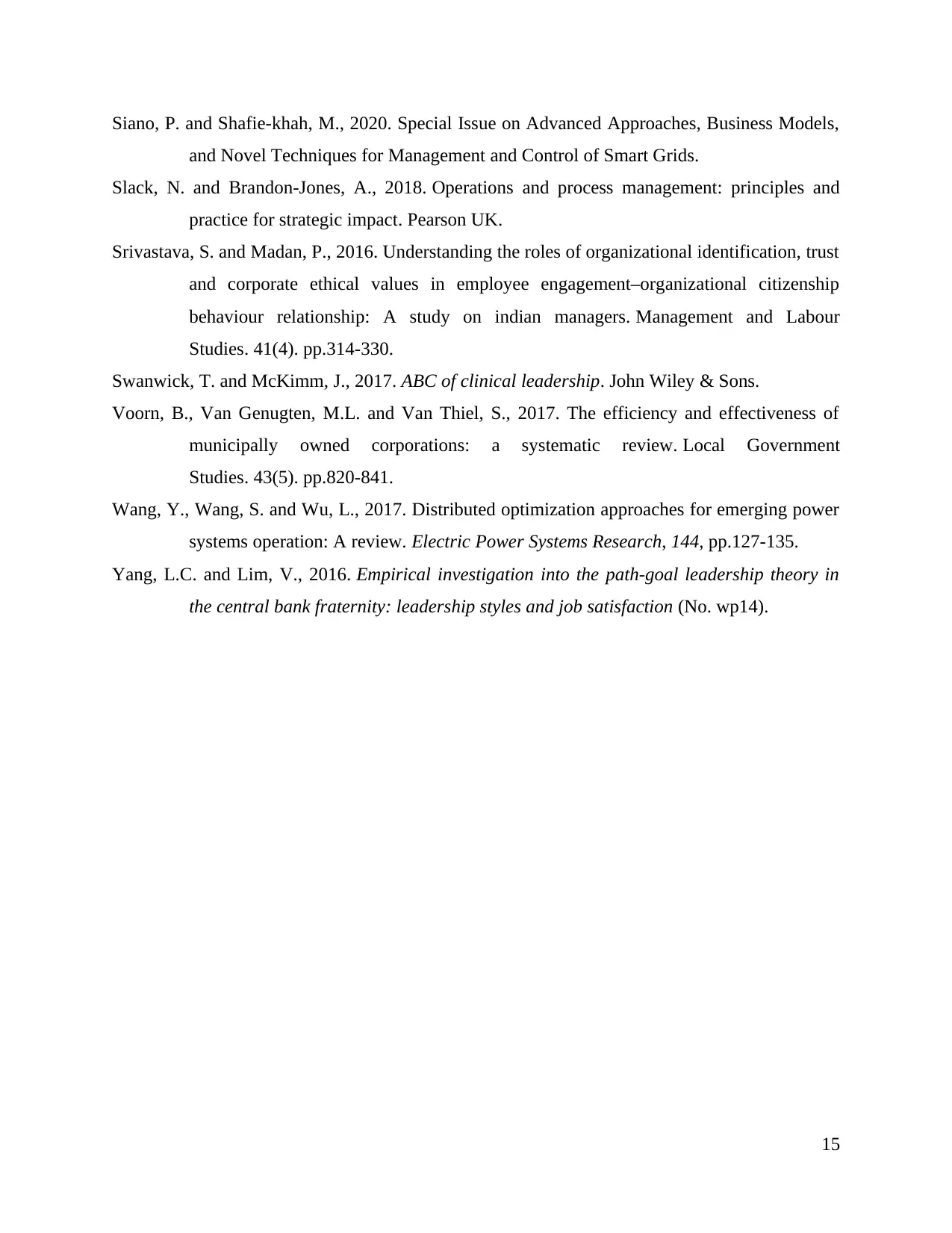
Siano, P. and Shafie-khah, M., 2020. Special Issue on Advanced Approaches, Business Models,
and Novel Techniques for Management and Control of Smart Grids.
Slack, N. and Brandon-Jones, A., 2018. Operations and process management: principles and
practice for strategic impact. Pearson UK.
Srivastava, S. and Madan, P., 2016. Understanding the roles of organizational identification, trust
and corporate ethical values in employee engagement–organizational citizenship
behaviour relationship: A study on indian managers. Management and Labour
Studies. 41(4). pp.314-330.
Swanwick, T. and McKimm, J., 2017. ABC of clinical leadership. John Wiley & Sons.
Voorn, B., Van Genugten, M.L. and Van Thiel, S., 2017. The efficiency and effectiveness of
municipally owned corporations: a systematic review. Local Government
Studies. 43(5). pp.820-841.
Wang, Y., Wang, S. and Wu, L., 2017. Distributed optimization approaches for emerging power
systems operation: A review. Electric Power Systems Research, 144, pp.127-135.
Yang, L.C. and Lim, V., 2016. Empirical investigation into the path-goal leadership theory in
the central bank fraternity: leadership styles and job satisfaction (No. wp14).
15
and Novel Techniques for Management and Control of Smart Grids.
Slack, N. and Brandon-Jones, A., 2018. Operations and process management: principles and
practice for strategic impact. Pearson UK.
Srivastava, S. and Madan, P., 2016. Understanding the roles of organizational identification, trust
and corporate ethical values in employee engagement–organizational citizenship
behaviour relationship: A study on indian managers. Management and Labour
Studies. 41(4). pp.314-330.
Swanwick, T. and McKimm, J., 2017. ABC of clinical leadership. John Wiley & Sons.
Voorn, B., Van Genugten, M.L. and Van Thiel, S., 2017. The efficiency and effectiveness of
municipally owned corporations: a systematic review. Local Government
Studies. 43(5). pp.820-841.
Wang, Y., Wang, S. and Wu, L., 2017. Distributed optimization approaches for emerging power
systems operation: A review. Electric Power Systems Research, 144, pp.127-135.
Yang, L.C. and Lim, V., 2016. Empirical investigation into the path-goal leadership theory in
the central bank fraternity: leadership styles and job satisfaction (No. wp14).
15
⊘ This is a preview!⊘
Do you want full access?
Subscribe today to unlock all pages.

Trusted by 1+ million students worldwide
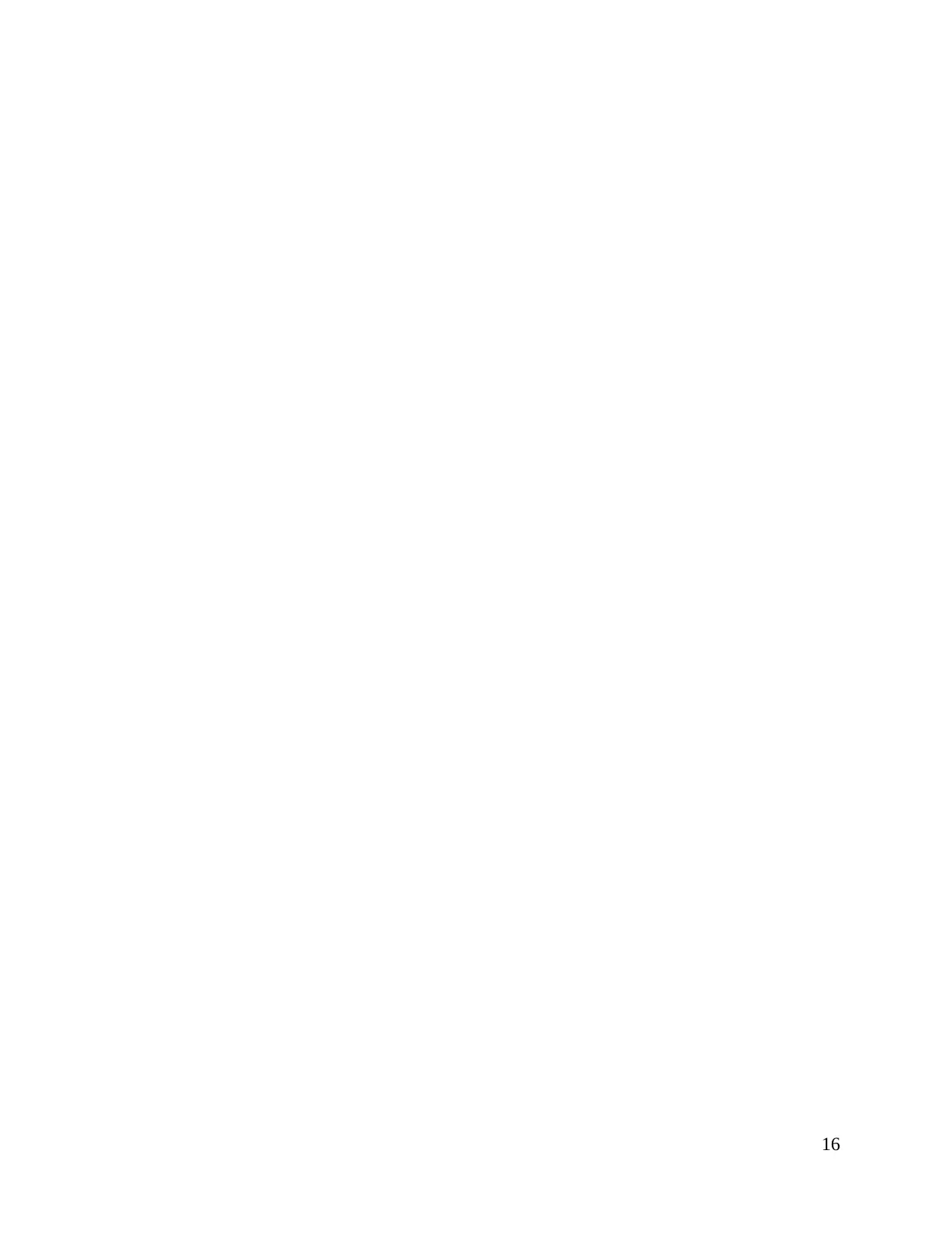
16
1 out of 16
Related Documents
Your All-in-One AI-Powered Toolkit for Academic Success.
+13062052269
info@desklib.com
Available 24*7 on WhatsApp / Email
![[object Object]](/_next/static/media/star-bottom.7253800d.svg)
Unlock your academic potential
© 2024 | Zucol Services PVT LTD | All rights reserved.





